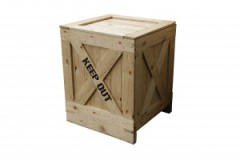Is Your Research Boxed-In?
 Many academics find themselves in an increasingly specialized area of research, which has benefits like creating an identity, increasing productivity and a feeling of belonging intellectually. Mats Alvesson and Jörgen Sandberg point out in their paper recently published in Organization Studies entitled “Habitat and Habitus: Boxed-in versus Box-Breaking Research,” that keeping within a particular research ‘box’ is a key mechanism for success within the Management and Organization Studies community. However, they argue for more ‘tolerance for box-breaking’, suggesting that by being skeptical and challenging of the field, by drawing on theories and conventions from other fields, and by deconstructing and negating dominant viewpoints in one’s own and others’ research, box changing, box jumping and box transcendence can lead to more dynamic and critical research.
Many academics find themselves in an increasingly specialized area of research, which has benefits like creating an identity, increasing productivity and a feeling of belonging intellectually. Mats Alvesson and Jörgen Sandberg point out in their paper recently published in Organization Studies entitled “Habitat and Habitus: Boxed-in versus Box-Breaking Research,” that keeping within a particular research ‘box’ is a key mechanism for success within the Management and Organization Studies community. However, they argue for more ‘tolerance for box-breaking’, suggesting that by being skeptical and challenging of the field, by drawing on theories and conventions from other fields, and by deconstructing and negating dominant viewpoints in one’s own and others’ research, box changing, box jumping and box transcendence can lead to more dynamic and critical research.
The abstract:
This paper argues that scholarly work is increasingly situated in narrowly circumscribed areas of study, which are encouraging specialization, incremental adding-to-the-literature contributions and a blinkered mindset. Researchers
invest considerable time and energy in these specialized areas in order to maximize their productivity and career prospects. We refer to this way of doing research and structuring careers as boxed-in research. While such research is normally portrayed as a template for good scholarship, it gives rise to significant problems in management and organization studies, as it tends to generate a shortage of novel and influential ideas. We propose box-breaking research as a strategy for how researchers and institutions can move away from the prevalence of boxed-in research and, thus, be able to generate more imaginative and influential research results. We suggest three versions: box changing, box jumping and, more ambitiously, box transcendence.
Click here to read “Habitat and Habitus: Boxed-in versus Box-Breaking Research” for free from Organization Studies. Don’t miss other research from Organization Studies! Click here to sign up for e-alerts!



























































































Dear sirs,
free access to the article is not possible
Best regards
Stefan Huf
Dr. Huf, Thank you for letting us know. The article is now open.